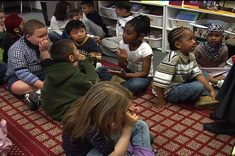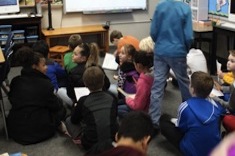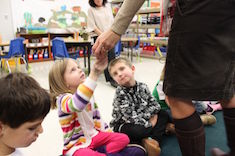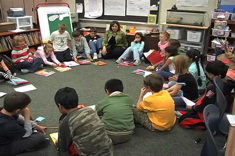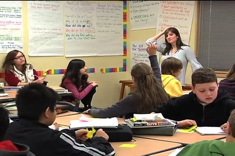We survey teachers periodically to help us reflect on our professional development sessions, and plan next steps for our coaching. Recently, we have noticed a pattern in the reflections of the teachers. Many noted the aspect of reading workshop they are least comfortable with is the group share. At first this didn’t make sense to us. The group share is the shortest part of reading workshop and it is usually a follow-up to the work students are doing during the workshop. This seems so straightforward — why would teachers lack confidence? We then asked these teachers why they were feeling this way, and discovered many issues.
When we talk about reading workshop with teachers we use a balanced literacy framework:

Within this framework, here are the essential components of the group share:
- Students are discussing what they are learning about themselves as readers.
- Students are active participants and respectful listeners.
- Students explain their metacognitive process while reading.
- Students are held accountable and students know they need to be prepared to share their thinking.
- The share session is connected to the focus lesson and is used as assessment data to inform the next day’s lesson.
- This time is purposeful.
Teachers reflected that it was easy to get students to talk about their books or discuss the strategy the class was learning. But they did not find it easy to get students talking about their metacognitive experiences. They also questioned how to use this time to gather assessment data to inform future lessons.
As coaches, we realized we had been making an incorrect assumption. We assumed that just because share time was short, it was easy. Because we assumed this curricular component was working well for teachers, we had fallen into a pattern of not modeling the group share in our demonstration lessons. Time is limited during demonstration lessons, so when we ran out of time, we almost always skipped modeling how to lead the whole-class share time.
Focusing on Metacognition
As Stephanie Harvey and Anne Goudvis note in Strategies That Work, “Research suggests that it isn’t enough for students to simply understand a given strategy. They must know when, why, and how to use it. Matching strategies to one’s purpose requires metacognitive knowledge — an awareness and understanding of how one thinks and uses strategies.” The workshop model gives students an opportunity to not only practice strategies, but to also be aware of when and how strategies are helpful to them as readers.
We want our students to be purposeful in their use of strategies so that the strategies become a means to an end and not an end unto themselves. When we use the group share to scaffold students’ sharing of how they are using strategies and how and when these strategies are effective. We are teaching our students to be aware of their metacognition. They learn that the strategies are not activities, but tools to help them understand text more deeply.
Modeling Metacognition
Although students do most of the talking during the group share, we realized that the teacher is still doing a lot of modeling by scaffolding their talk. As students talk, we are explicitly pointing out strategies they are using, and breaking down the elements of the student’s metacognition. The teacher’s role is purposeful in this component of reading workshop, and the modeling is based on the students’ responses. We may not be planning our explicit modeling for the group share ahead of time, but we still know we will be modeling as we hear what the students are saying.
For example, in a first-grade classroom a student shares that he understood how the character in his book felt when he dropped his ice cream cone. The teacher scaffolds the student by reflecting, “So when you read about the boy dropping his ice cream cone, you thought about a time when you dropped your ice cream cone. Your schema had that memory and you could think about your feelings when that happened. You remember feeling sad and frustrated when you dropped your ice cream cone, so you are making a connection with the character and understanding how he is feeling. We call this making a connection. When readers make connections they understand the characters and the story better.”
Metacognition consists of three basic elements:
- Developing a plan of action.
- Maintaining/monitoring the plan.
- Evaluating the plan.
We are constantly assessing our students’ ability to use the strategies purposefully and with intention. Students should be flexible in their use of strategies, and adapt when needed to make sense of what they are reading.
We want our students to come to view the group share as a platform to learn, ask questions, share struggles, listen, and build understanding with their peers. Students need to understand their role is to be a full participant during this time and they will be held accountable for the thinking and the work they are doing during the independent work time in reading workshop. If students are not participating this would become the focus of future large and small group lessons to model different options of how to participate and reset participation expectations.
Modeling All Components of Reader’s Workshop
We now understand that there were some unintended consequences when we continually cut out modeling the group share during our demonstrations in classrooms:
1. we sent a message that the group share was not that important;
2. teachers were unclear how to lead the sessions; and
3. students and teachers lacked models for metacognition.
As a result, some teachers stopped doing the group share, or the group share remained a time to chat about reading in a superficial way.
Now we always model all aspects of whatever it is we are exploring with teachers. When our time in the classroom is limited, we are careful to begin some of our coaching sessions after the teacher has finished the focus lesson in reading workshop. We enter the classroom when the students are already engaged in independent and small group reading. Our coaching is then focused on conferring, small-group instruction and the group share. We make time to focus on this component of reading workshop, and explicitly model how to scaffold students’ metacognitive thinking and talk around their work as readers.
There is always so much work to do as a coach and never enough time. We’ve learned to review our coaching notes to make certain we have focused on different types of demonstration lessons and all aspects of reading and writing workshops. If we don’t focus and model an element of the workshop, teachers will assume it is not valued by us. We look for patterns of what we miss due to time, and are deliberate in making sure we fit these topics into our sessions.

